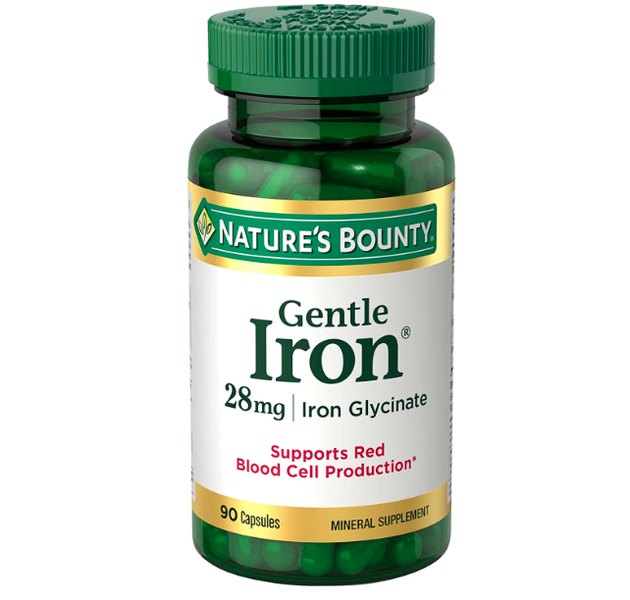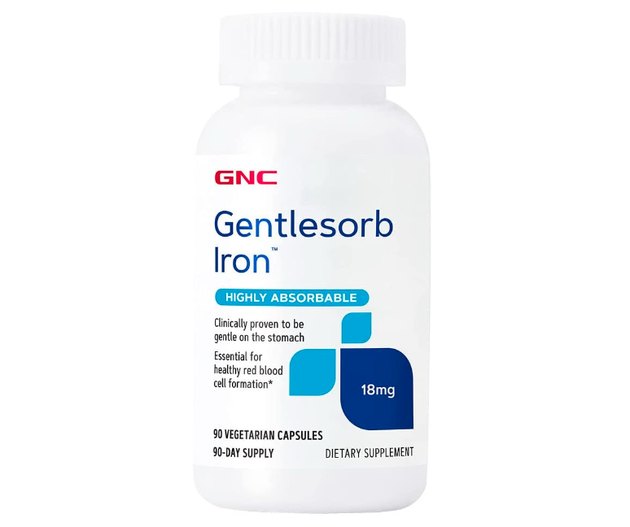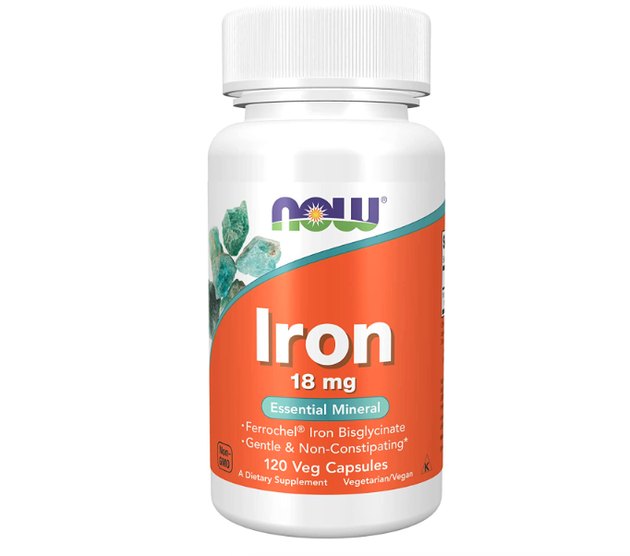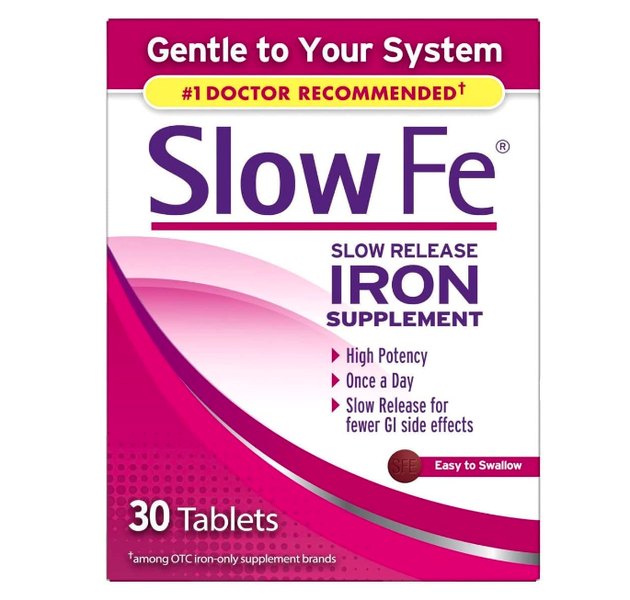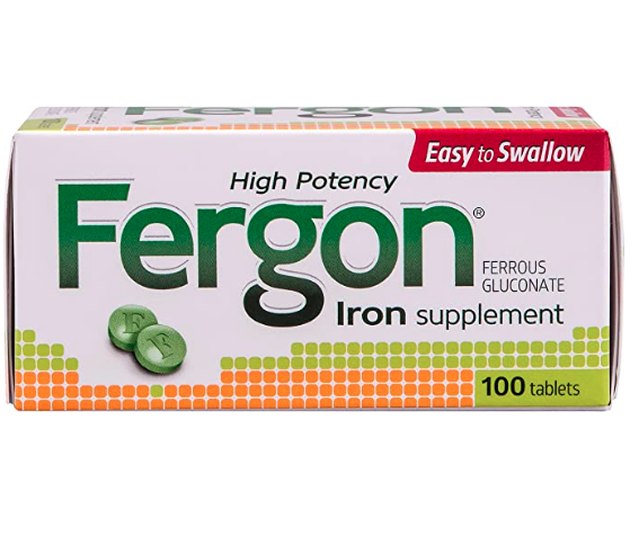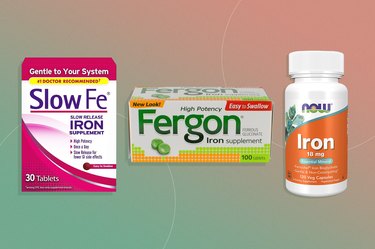
An iron deficiency can leave you feeling tired, cold and weak, according to the Mayo Clinic. Taking daily iron pills can bring your levels up and help you feel better — but, it may also upset your stomach.
"Gentle" iron supplements are formulated to reduce gastrointestinal side effects — for instance, there are some iron supplements that are less likely to cause constipation or diarrhea. Plus, you can lessen your symptoms by taking your supplement with certain foods.
Video of the Day
Video of the Day
Here are some of the best iron supplements to try if iron upsets your stomach.
Tip
Before taking an iron supplement, ask your doctor for a blood test to check if your iron levels are low (anything under 10 g/dL is anemic and an iron level 5 g/dL is severely anemic). And if you take medications, always talk to your doc before starting a new supplement as iron may interfere with certain meds.
Types of Iron Supplements
Iron in supplements comes in many different forms, including ferrous, ferric (iron salts), carbonyl iron, heme iron polypeptides, iron amino-acid chelates and polysaccharide-iron complex, says dietitian Cristina Caro, RDN and spokesperson for the hospitality group Sodexo.
They're all easily absorbed when taken with water, per ConsumerLab, an organization that tests health products. But taking them without food can sometimes lead to GI issues.
If you often get side effects from iron supplements, these forms are associated with fewer stomach symptoms, according to the Society for the Advancement of Blood Management:
- iron bisglycinate
- iron protein succinylate
Gentle iron supplements are not without side effects, but you may find that they reduce stomach upset to a more tolerable level.
Our Picks
- Best Overall: Nature’s Bounty Gentle Iron ($18.99 for 3, Amazon.com)
- Best Budget-Friendly: GNC Gentlesorb Iron ($14.99, Amazon.com)
- Best Vegan: NOW Iron ($15.93, Amazon.com)
- Best Slow-Release: Slow Fe Slow-Release Iron ($22.20 for 2, Amazon.com)
- Best Low-Dose: Fergon High Potency Iron ($11.88, Amazon.com)
How We Chose
The FDA doesn't regulate supplement safety and efficacy before products are sold. So to find the best gentle iron supplements on the market, we spoke to a dietitian for her top picks and chose products that have verification from independent quality control organizations such as:
Learn more about how we cover products here.
1. Best Overall: Nature’s Bounty Gentle Iron
This supplement "can be taken with food to reduce irritation while still being absorbed well," Caro says.
They're also free of artificial colors, flavors and sweeteners and don't contain any preservatives.
2. Best Budget-Friendly: GNC Gentlesorb Iron
This GNC pick is a top low-cost iron protein chelate supplement — and because it's made of iron protein chelate, it's less likely to upset your stomach, according to a November 2018 study in Current Pediatric Reviews.
It's both wheat- and gluten-free and contains no artificial colors or flavors.
3. Best Vegan: NOW Supplements Iron
Vegans and vegetarians miss out on heme iron, a form of the mineral that's found in red meat and is easily absorbed, per the Mayo Clinic. NOW's vegan iron supplement uses a form of iron that can be taken with food but still absorbs well, Caro says.
With 18 milligrams of iron, it provides 100 percent of your daily value (DV). That's the precise amount recommended for adults who menstruate, according to the National Institutes of Health (NIH).
Children and adults who do not menstruate require far less of this mineral.
4. Best Slow-Release: Slow Fe Slow-Release Iron
If you struggle with GI issues when you take iron supplements, an extended-release option — such as Slow Fe Slow Release Iron — may be beneficial. This type of supplement will deliver iron over a longer period, Caro says.
While it may mean you absorb less iron, the supplement will have less of an effect on your appetite and up the chances that you'll stick with taking it, Caro says.
This supplement offers 250 percent of your DV of iron.
5. Best Low-Dose: Fergon High-Potency Iron
As you've seen, many iron supplements offer a lot of iron — far more than your DV. If you're looking to add iron, but don't want to overdo it, Fergon High Potency is a good option, with 150 percent of your DV of iron.
This supplement claims to cause fewer stomach-related side effects, according to the manufacturer.
How to Take Iron Supplements
Iron is best absorbed when taken on an empty stomach, according to the U.S. National Library of Medicine (NLM). Still, taking iron pills with a small amount of food may help prevent your upset stomach.
But choose what you eat carefully: "Foods and beverages containing caffeine, calcium, fiber, phytates or tannins can interfere with iron absorption," Caro says.
Make sure to wait until 2 hours after you've taken an iron supplement to eat these foods:
- Caffeinated foods: Coffee, tea, some sodas, energy drinks, chocolate
- Calcium-rich foods: Milk, cheese, yogurt
- Fiber-rich foods: Whole grains, raw vegetables, bran
- Foods with tannins: Coffee, tea, wine, chocolate
Instead, choose foods high in vitamin C — fruits and vegetables — which improve iron absorption, Caro says.
Iron in Your Diet
Increasing your intake of iron-rich foods may help resolve your iron deficiency sooner so you can stop taking iron pills. Eating these foods regularly can prevent iron deficiency in the future.
Some of the best food sources of iron, according to the NIH, include:
- Meat
- Seafood
- Poultry
- Iron-fortified cereals and breads
- White and kidney beans
- Lentils
- Peas
- Nuts
As with supplements, you should avoid eating dairy foods, caffeine and spinach with iron-rich foods. Pairing these foods with a source of vitamin C can help improve absorption.
- Mayo Clinic: "Iron deficiency anemia"
- ConsumerLab: "Iron Supplements Review (Iron Pills, Liquids and Gummies)"
- National Institutes of Health: "Iron"
- Mayo Clinic: "Iron Supplement (Oral Route, Parenteral Route)"
- U.S. National Library of Medicine: "Taking iron supplements"
- SABM: "Iron Corner"
- Current Pediatric Reviews: "Iron Bisglycinate Chelate and Polymaltose Iron for the Treatment of Iron Deficiency Anemia: A Pilot Randomized Trial"
